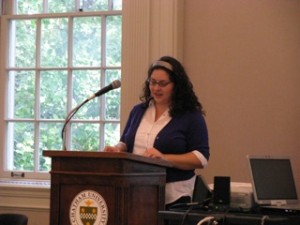Allie Reznik
President, Alpha Delta Lambda chapter, Chatham University
Carson Academic and Creative Writing Conference, September 25, 2010, 9 a.m. – 3 p.m., Chatham University Shady Side Campus
Early on Saturday morning, Sept. 25, attendees of the Carson Academic and Creative Writing Conference at Chatham University were asked to silently read this…
jfashl ekspretions and hed moovmints
can yu tel how sumwun feals abowt yu bu reding boddi langwij? authoryteas klame yu can, frum thu luuk uv skorne, however phleting, too thu suttle nods and brite ize that sae sumwun iz reesepyv too yor thauts…
As Becky Carpenter, Director of Special Projects at the Greater Pittsburgh Literacy Council, watched each participant she noticed that students and professors alike read with confusion and frustration. I repressed my English major reflexes of wanting to snatch a pen and revise the text. We were informed that the text is written by someone just below the official level “low literate.” She then pressed all of us to think about what restrictions someone would face if they were not literate. Responses from not being able to most likely not being able to find a well-paying job to not knowing what type of service you receive at the doctor’s office to not being able to take care of finances were daunting. During a day of intellectual vigor, it was humble yet refreshing to recall our opportunities as members of Sigma Tau Delta.
This was an eye-opening moment for all of us, as everyone was nervous for their own panels that included reading Toni Morrison from an eco-critical lens to discussing realist theories of international politics. In that instance, we were all reminded of our privilege to have the ability to revise. The first session was an amazing opportunity for participants from Chatham University’s undergraduate and graduate program, University of Pittsburgh at Greensburg, University of Pittsburgh Main, Duquesne University, Ohio Wesleyan University and Westminster College to network with the Greater Pittsburgh Literacy Council and learn more about making a direct influence in the community by corresponding with a student through email to teaching a mini- class.
Imagine a space and time where your professors speak about their personal experiences and life-changing moments. Not your necessarily average day in class, right? During the second session, “Moments of Revision” Chatham University professors offered their own anecdotes of when their perceptions of the world were changed in academia. Dr. Lynne Bruckner, Associate Professor of English, talked about her experiences digging in the dirt paired with work on ecocritical Shakespeare. While Greg Garrard, author of Ecocriticism rejected the idea of eco-criticism at a conference panel she was on, his mea culpa lead to his realization that eco-criticism is Shakespearean.” Here, students realized the peculiar character of scholarship: to be relevant it must always be questioned and in flux rather than accepted as “Truth.” Dr. Alice Julier, Program Director and Associate Professor of Food Studies, emphasized the importance of having a “holistic way of seeing” as an academic who personally went from studying sociology to being passionate about the politics of food. Dr. Heather McNaugher, Assistant Professor of English, emphasized the imperative academic goal of exposing the term and perception of “natural” as troubling. It is the goal of academics, in any discipline, to realize the chronic cultural maintenance to uphold the façade of natural, especially in terms of gender binaries. Professor Sandy Sterner, Senior Lecturer, recalled when John Gardner came to Chatham and told the creative writing students that “you must learn the tricks.” Her own perception of creative writing was changed from then on, perceived more a craft “like being a bricklayer” in which the skill must be honed and revised. Finally, Dr. Prajna Parasher, Program Director and Associate Professor of Film and Digital Technology shared her ritual of academic work: “I sit by the window, close my eyes and see.” It is in this moment of self reflection that we can begin to create our visions and “revisions” of the world. She cited Nietzsche in order to once again remind us as our goals of aspiring and established academics. She said “Truths are illusions that one has forgotten.” Being able to understand what is established can lead to deconstructing and revising it. Literacy must be established in order for everyone to analyze and effectively change their world.
Students participated in lively conversations on panels such as “Revisioning Creativity,” “Revisioning American History through Literature,” “Revisioning Politics and Literature” and “Revisioning Environmental Systems.” All of these panels discussed threads of environmentalism, international awareness and women’s leadership.
While planning an entire conference from start to finish can be immensely stressful, it is essential to look beyond the incessant button making, set up requests to facilities and changing peoples’ titles in the program days before and keep the important goal in mind- in this case revising the world around us. Dr. William Lenz, faculty adviser of the Alpha Delta Lambda chapter, asked all of us to keep in mind the work of alumna Rachel Carson, after who the Carson Conference is named. He said “to have the courage to challenge and revise the world around us is what we must aspire to.” The Carson Academic and Creative Writing Conference was an inspiring opportunity to share each others’ vision in order to collaborate and instigate change.
